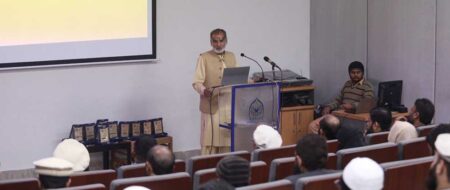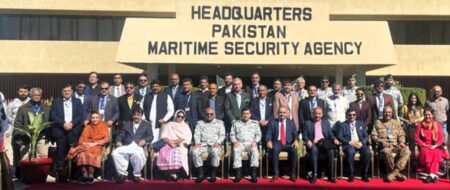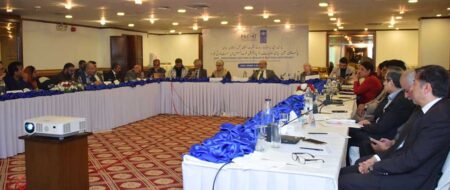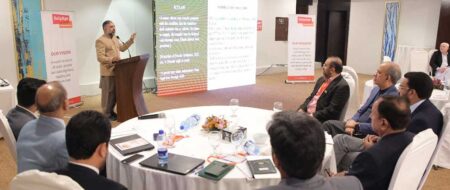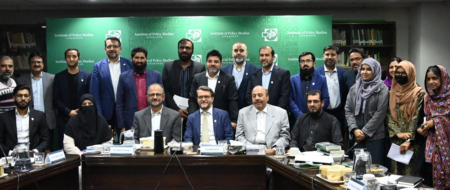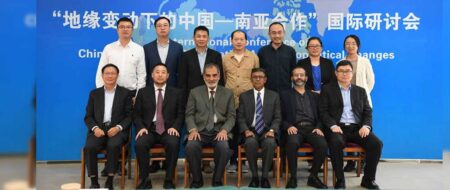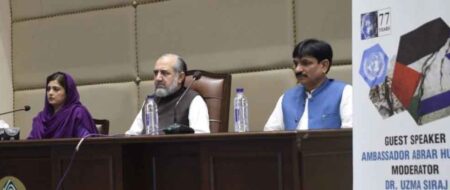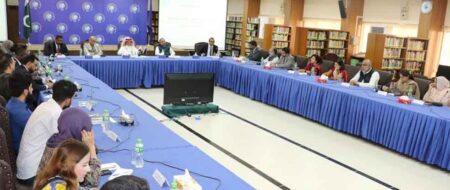Chairman IPS attends moot on BRI legal cooperation in China
In the spirit of building a community of shared destiny and inclusivity to meet the lawful rights and interests of all while integrating the economic, social, ecological, and security dimensions of global governance, the Belt and Road Initiative (BRI), with its unique legal cooperative framework, China International Commercial Court (CICC), has set off the process of developing a new model of governance.
The creation of the CICC is an unprecedented move for China’s legal system to optimize the use of mediation, arbitration, and judicial settlement possibilities in light of the Chinese system and tradition for dispute resolution, and it might have a significant impact on the resolution of cross-border conflicts.
This was observed by IPS Chairman Khalid Rahman during his keynote speech at the first China (Kashgar)-Central Asia & South Asia Legal Forum, being held on the 10th anniversary of the Belt and Road Initiative in Kashgar City, Xinjiang, China, on October 29-31, 2023.
The Forum, on the theme of ‘Legal Protection for High Quality Development of Belt and Road Initiative,’ was jointly held by the Law Society of Xinjiang Uyghur Autonomous Region of China, the Law Society of Guangdong Province of China, and the China Legal Exchange Centre.
The Forum was attended by officials from the governmental legal departments of China, Central Asia, and South Asia, legal experts, scholars, and practitioners who presented their insights on the topics of ‘Optimizing Business Environment and Promoting the Construction of Belt and Road Initiative’ and ‘Researches on Belt and Road Legal Services and Legal Cooperation Mechanisms.’ The Forum included 35 foreign delegates from Pakistan, Kazakhstan, Kyrgyzstan, Tajikistan, Turkmenistan, Uzbekistan, Nepal, Sri Lanka, and India.
The key to preventing conflicts from escalating into wars lies in establishing a robust system of governance where nations and groups can work together under a common framework, said Khalid Rahman.
Despite the proliferation of international laws and agreements on conflict resolution, the world’s security situation remains fragile, with wars continuing to ravage countries.
With increased attention on shared destiny, sustainable public goods, inclusivity, and consultations to meet the interests of all, while integrating economic, social, ecological, and security dimensions of global governance, the Belt and Road Initiative (BRI) appears to have triggered a process of a new model of governance with the innovative approach and legal framework underpinning BRI that stands out.
In this regard, the establishment of the China International Commercial Court (CICC) and guidelines for judicial services is a distinctive innovation to optimize the use of mediation, arbitration, and judicial settlement possibilities in light of the Chinese system and tradition for dispute resolution, significantly relying on mutual consultation and cooperation.
He further stated that BRI promotes active and voluntary participation as opposed to passive, or, rivalry-based engagement under the existing global governance model. The five spheres of formal legal arrangements include policy coordination, building infrastructure for connectivity, removing trade restrictions, financial integration, and greater opportunities for people-to-people contacts. These agreements offer flexibility, recognizing the unique circumstances and national conditions of each participating country.
Moreover, BRI, underpinned by a commitment to upholding the Sustainable Development Goals (SDGs) and adhering to internationally agreed principles and regulatory frameworks, places a strong emphasis on “green” policies, demonstrating a shift from the conventional approach of development first and green later.
He underscored that China’s active participation in the reform of global governance is crucial for the transformation of global governance. In this regard, BRI’s impact is undeniable, as it has inspired similar initiatives globally, including BUILD Act, Build Back Better World (B3W), Global Gateway, and the India-Middle East-Europe Corridor.
These initiatives collectively have the potential to enhance global governance, promoting equality, inclusivity, and diversity through connectivity and cooperation.



